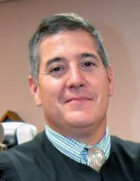First Person
War is a terrible thing. I did not always know that.
When I was a young boy, the ancient Greek and Roman adventures I read inspired my imagination. In middle school, I read “The Red Badge of Courage” and wondered if I would have the grit to stand in battle. While attending New Mexico Military Institute, I learned about tactics and read about modern warfare. Ultimately, this all lead to my commission in the U.S. Army.

Magistrate John Chavez
It was on an early morning in September 1990 that I boarded a plane to go to war. My unit was not supposed to leave for another two weeks but the schedule changed and with eight hours’ notice, we were wheels up from Fort Bliss, Texas. I had a naïve excitement to go to war and to fight for the freedom of the Kuwaiti nation — a county, a people, a culture that I knew nothing about. My excitement overshadowed what should have been a greater concern for my wife and the two daughters I was leaving behind.
Many veterans will agree that “Hurry up and Wait!” should be the unofficial motto of the military. After landing in the hot desert of Saudi Arabia we waited, we prepared, we waited, we moved positions, we waited, we organized, we waited, we trained and then we went.
Eight months would pass before we crossed the berm into Iraq. We were ready. After making my parents promise they would take care of my wife and daughters, I had made a sort of peace that I would not come home. I was ready.
The ground war was quick, maybe too quick. Just under 100 hours in which we drove, and we fought without sleep. The things I saw still haunt my nights when I give them the chance. Terrible things that cannot be of this world. Mostly I keep them locked away and I seldom share the details.
We deployed home quicker than expected. We were welcomed back with open arms. My wife, our two daughters, parents, sisters, aunts and cousins were there the day I landed back on the same airfield at Fort Bliss. What followed was a whirlwind of parades and awards ceremonies. It was hard for me to reconcile the terrible things I witnessed against the confetti-filled celebration. I felt anger, sadness, and joy; eventually I found a sort of emotional parity.
While some of my fellow soldiers left the military following Desert Storm, I made a career of it. In the latter part of the 1990s, I was part of multiple operational deployments in support of the no-fly-zone established over Iraq in forgotten operations named Desert Fox and Desert Thunder.
On Sept. 11, 2001, my family and I were stationed in South Korea. We all have our own individual memories of where we were when the towers fell, and I am no different. As news came in of a lost classmate in the Pentagon, I felt again the righteous anger that wanted those responsible to pay. Over the next few years, we would witness the deployment of troops to both Afghanistan and Iraq. News of lost friends would sadden our hearts.
Our political objectives changed over time and we stayed. We stayed as we solemnly watched our troops come home in flag-draped coffins. We stayed through four presidents. We stayed as the nation’s attention changed from the war to natural disasters, to the housing market collapse, and to COVID-19.
In the midst of this, the longest war in history, I returned to Iraq in 2010. Now an Army colonel, I had become unnaturally accustomed to war. I recall wondering, as the wheels of the aircraft hit the ground, about what it meant to have “won” in Desert Storm only to be back in Iraq again.
At the U.S. Army War College, my graduate thesis was titled “WAR: Will, Action and Resources.” It was an attempt to take the many established theories of war and look at them through a contemporary lens. In hindsight, my motivation was probably less about solving a specific problem and more about trying to reconcile a ledger from my own past.
In the wake of the final withdrawal from Afghanistan, a friend asked on Facebook, “When was the last time America won a war?” My answer was immediate, “Difficult to answer, it depends on how you define ‘won’. I am a 27 year Army veteran with three combat tours — in my opinion, nobody ‘wins’ a war.”
How can we measure wins and loses in a war? Is it through the loss of life on one side compared to the other, as we attempted to do in Vietnam with attrition warfare? Is it the amount of money spent? Did we achieve the objectives we initially set? How about the objectives that morphed over time?
Is a win or a loss different for a president from that of the friend of a fallen solider? A general or a Gold Star parent? Win and lose are just too simplistic to capture the totality of what war is or the impact on those impacted directly by it.
On Saturday, we will mark the 20th anniversary of 9/11 and each year we vow to “Never Forget.” This year, it follows the loss of 11 marines, a soldier and a sailor that died on Aug. 26. They numbered 13 — 13 brave Americans. Thirteen souls in the ledger of the dead paid in a 20-year war. The oldest was 11-years old on 9-11, the rest too young to have concrete memory of the impetus for this war they were engaged in.
As we do for the 2,977 who died on 9-11-2001, I pray we never forget the last 13 nor any of 5,448 who gave their lives in between. Because they are not numbers on a ledger, they are names.
Marine Corps Staff Sgt. Darin T. Hoover, 31, of Salt Lake City, Utah
Marine Corps Sgt. Johanny Rosario Pichardo, 25, of Lawrence, Mass.
Marine Corps Sgt. Nicole L. Gee, 23, Sacramento, Calif.
Marine Corps Cpl. Hunter Lopez, 22, Indio, Calif.
Marine Corps Cpl. Daegan W. Page, 23, Omaha, Neb.
Marine Corps Cpl. Humberto A. Sanchez, 22, Logansport, Ind.
Marine Corps Lance Cpl. David L. Espinoza, 20, Rio Bravo, Texas
Marine Corps Lance Cpl. Jared M. Schmitz, 20, St. Charles, Mo.
Marine Corps Lance Cpl. Rylee J. McCollum, 20, Jackson, Wyo.
Marine Corps Lance Cpl. Dylan R. Merola, 20, Rancho Cucamonga, Calif.
Marine Corps Lance Cpl. Kareem M. Nikoui, 20, Norco, Calif.
Staff Sgt. Ryan C. Knauss, 23, Corryton, Tenn.
Navy Corpsman Maxton W. Soviak, 22, Berlin Heights, Ohio.

Judge John Chavez, guest columnist
Magistrate Judge John R. Chavez is the magistrate in Belen. He is a native of Valencia County and is a retired U.S. Army colonel.
















